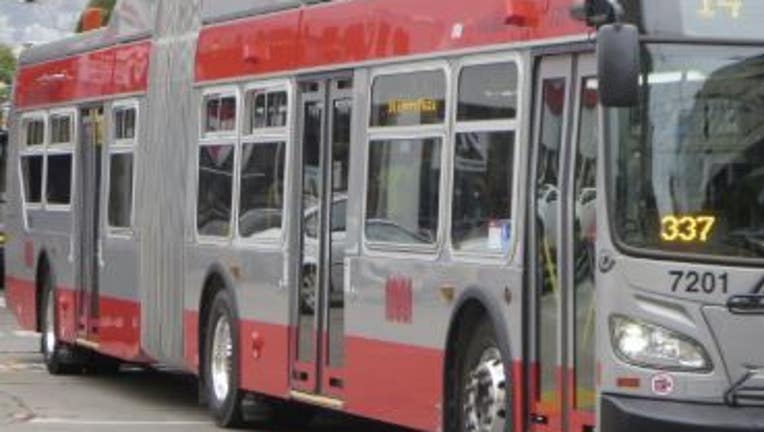SF supervisors proposed 'Free Muni' pilot program to encourage ridership as city reopens

File of Muni 14-Line bus. On March 29, 2021 San Francisco police announced an arrest in an assault that left a Muni passenger critically injured last October.
SAN FRANCISCO - Two San Francisco supervisors on Tuesday proposed legislation to fund a three-month pilot program providing free public transit to boost San Francisco Municipal Transportation Agency ridership, which plummeted during the COVID-19 pandemic.
The legislation, authored by supervisors Dean Preston and Matt Haney, would provide one-time funding for the program and aims to incentivize using public transit over vehicles as residents get back to work.
"A year into the pandemic, San Francisco residents are struggling and need our help. Free Muni will bring them some relief and help restore ridership as Muni gets back on track," Preston said. "Our goal is to make sure public transportation is extensive and widely-used, especially as we recover from this pandemic."
Under the proposal, the board would appropriate funds for the program with the condition the program start on July 1.
Preston estimates the move will help save frequent Muni riders $81 a month, the price of a monthly Muni pass, or possibly more for those who pay for single trips daily.
"As the economy reopens, it is critical that we use every tool at our disposal to incentivize the use of public transit. Supporting public transit during our recovery should include improved and enhanced service and the elimination of fares, at least during the COVID emergency and recovery," Haney said. "Free transit for riders is a win-win for our residents and our environment. It'll be a benefit to all of us, whether or not you are a Muni rider yourself."
Since the pandemic began more than a year ago, Muni, like all other Bay Area transit agencies, saw a dramatic decline in ridership, resulting in damaging revenue loss that's led to decreased service.
In a statement, Muni officials said the agency is open to working with the supervisors on adressing affordability, but the details surrounding the free transit program still need to be hammered out as resources remain scarce.
"Given our growing structural deficit, we welcome all the support we can get from the (city's) general fund. However, we are unclear about the study objectives for the proposed pilot. During the most trying months of the pandemic for San Franciscans, we operated without fare enforcement," Muni officials said.
"Right now, we can only operate 70 percent of pre-COVID service levels and we're forced to leave essential workers behind at the curb everyday. We want to make Muni affordable to all San Franciscans, but we need to have a productive conversation about the best use of $9 million from the general fund. We're always looking for ways to remove barriers and make Muni more accessible -- and restoring our service and focusing on reliability are the most equitable ways to create access with one-time funds," Muni officials said.
Major U.S. cities like Fresno, Boston, Kansas City and Washington D.C. have recently enacted similar legislation to provide free public transit.

